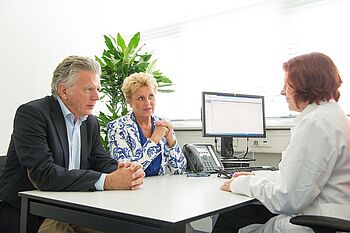Joint press relase DZNE and vfa bio
Bonn, November, 18th, 2013. “The aging society is one of the greatest challenges society has to face in the future. One of the most important goals is the development of new translational research strategies with the aim to combat common diseases,” said Prof. Dr. Thomas Klockgether, Director for Clinical Research at the German Center for Neurodegenerative Diseases (DZNE) during his speech at the event “Demographic change – so what?!” in Bonn, Germany. The organizer of the event was the DZNE in partnership with the vfa bio, the biotechnology group within Association of Research-Based Pharmaceutical Companies (vfa) (Verband der forschenden Pharma-Unternehmen, vfa). The event took place as a part of the BMBF Science Year 2013 “The Demographic Opportunity.”
“If we want to tackle the challenges of the demographic change in terms of medical aspects, we should not only consider age-related diseases,” said Dr. Frank Mathias, the Chairman of vfa bio, who is also the CEO of Medigene AG, Munich. “It is also essential to come up with new therapies that address patients with chronic diseases also in earlier parts of their lives so that they can continue to earn a living and remain active participants in community life. This is helpful for both, the people affected and society overall, because it is one way to counteract the lack of qualified workers.”
As a result of a rising life expectancy and declining birth rates Germany’s population structure will increasingly change over the next few decades: the society is “aging”. But does higher age go hand in hand with more disease? Studies conducted by the DZNE and the University of Rostock have revealed that the increase in life expectancy is accompanied by an increase in healthy life years. Nevertheless, the number of very old people and therefore patients suffering from neurodegenerative diseases or from several chronic conditions rises.
The German healthcare system will have to be aligned with these developments. This requires joint efforts by all partners in charge – in politics, healthcare, research and all citizens. The representatives of these groups share their insights on challenges and approaches to solutions during events like this.
Challenge Dementia
The burden on society related to neurodegenerative diseases such as Alzheimer’s disease is growing continuously. “Although we have made considerable progress in the fundamental understanding of neurodegeneration, only symptomatic therapies for neurodegenerative diseases are available,” said Prof. Klockgether, DZNE. “Consequently, we have to foster the implementation of results from fundamental research into new therapeutical approaches. Moreover, new sustainable structures in health care for people with dementia have to be set up in the next years.” DZNE`s mission is to research the causes of these brain disorders and to develop new strategies for the prevention and treatment of these diseases. It also aims for providing new approaches in health care.
Medical achievements for patients suffering from chronic diseases
Inflammatory rheumatic diseases and multiple sclerosis are among the illnesses that might affect also younger patients who are still actively engaged in their careers and work life. In recent years, the progress that has been made in the treatment of these diseases can be attributed primarily to biopharmaceuticals, i.e. medications manufactured utilizing gene technology. Biopharmaceuticals for the treatment of other inflammatory diseases, cancer and cardiovascular problems will likely be introduced in the near future.
Dr. Mathias of the vfa bio commented: “In order to be able to utilize the potential of medical biotechnology in particular also in times of major demographic changes, the fragile innovation cycle, which passes through the stages of respect for innovation, adequate remuneration and reinvestment of the earnings into new research and development work, will have to be maintained. Germany could and should do more to achieve this.”

